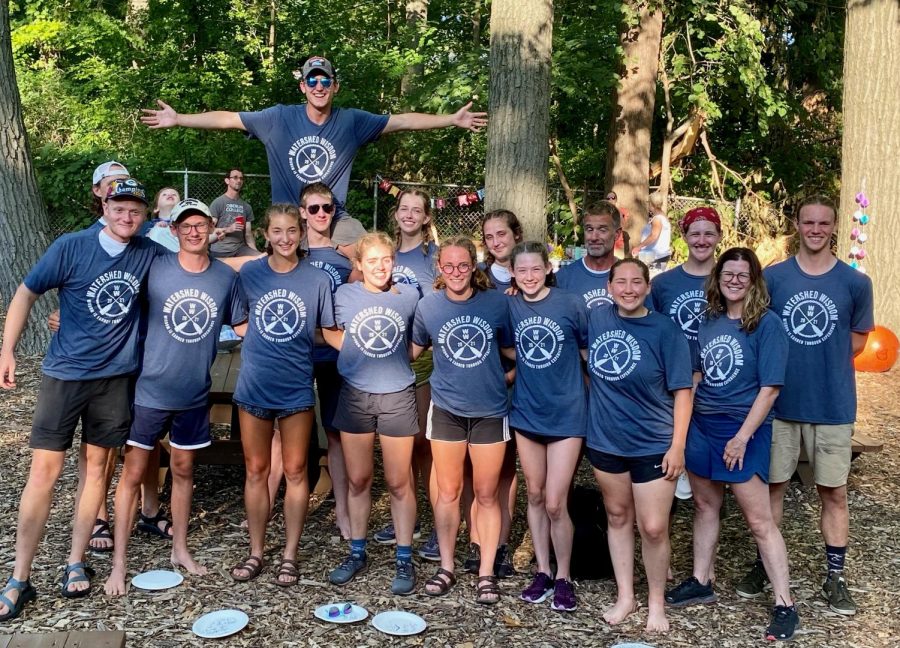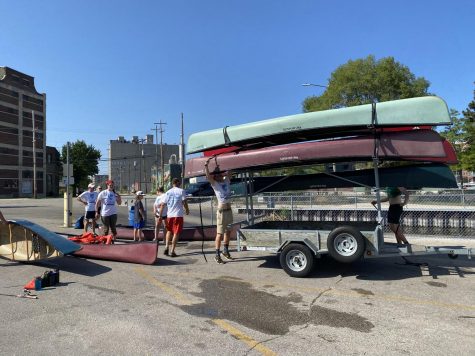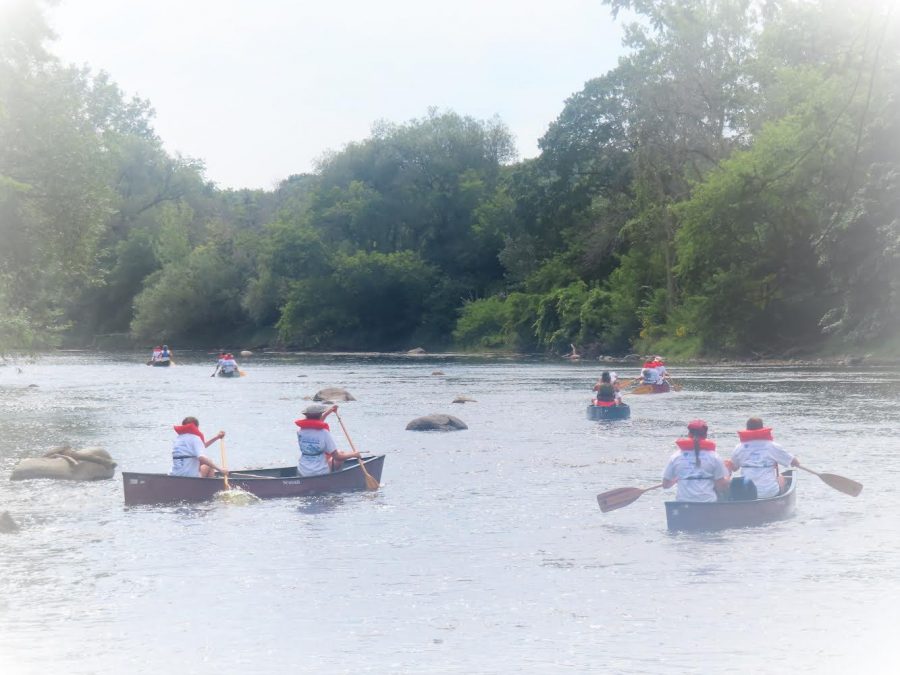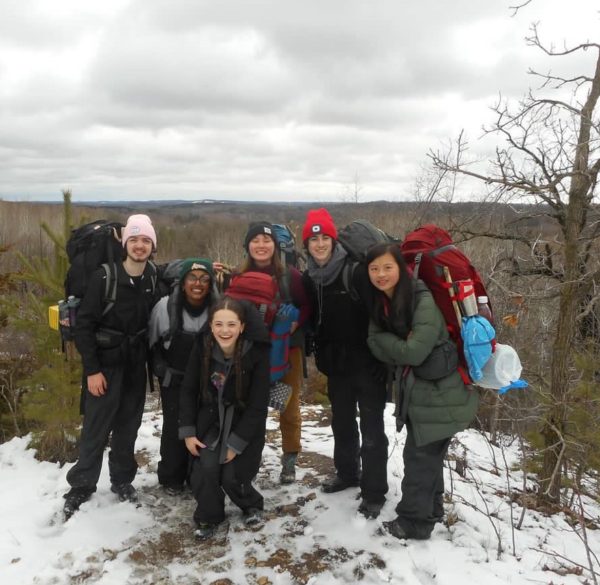Watershed Wisdom camping trip a success
Watershed students canoe down the Milwaukee River. They canoed from the headwaters of the Milwaukee River to the waters of Lake Michigan.
In August, students in Watershed Wisdom left for their annual expedition to study the boundaries and intricacies of the Milwaukee River Watershed. After the expedition was canceled in 2020 due to COVID-19, other students were finally able to participate in the headline attraction of the course.
Watershed Wisdom is an interdisciplinary, three-credit course, covering topics in English, science and art. Every year, beginning in February, students begin to learn about what makes Shorewood and the whole of the Great Lakes unique: their diverse watersheds. Shorewood is part of the Milwaukee River Watershed, meaning that all rainwater and streams flow into the Milwaukee River and eventually Lake Michigan.
Throughout the class, students learn about the Milwaukee River Watershed from angles of science, English and art, giving them a more in depth perspective of the environment around Shorewood.
“Since we live in a very water-rich part of the world, one really good way to define home is using the boundaries of our watershed,” said Eric Gietzen, English teacher and founder of the Watershed Wisdom class. “Once we do a deep dive into what a watershed is and why it’s important, students tend to understand what it means to be home.”
While the most prominent part of Watershed Wisdom is the expedition in the summer, the class includes much more throughout the year, including reading literature about watersheds, learning about native species, and completing art assignments. However, due to the pandemic, meeting to discuss these topics was more difficult. With restrictions on in-person meetings and virtual learning, Watershed teachers turned to hands-on, outdoor teaching as their primary vehicle.
“Mitigating COVID by being outside was one of the first things we thought of, we know how to do that,” Gietzen said. “But when it came time to think about the expedition for this year, we decided to defer… normally we take this trip in June as soon as we can but we couldn’t do that this year because of the pandemic.”
Even with the threat of COVID, the Watershed class still found ways to cover subject material in innovative ways. To gain a deeper understanding of places, plants and organisms in the watershed, students also take multiple smaller, subject-focused field trips to other locations in the Milwaukee River Watershed, such as the Cedarburg Bog or the Shorewood Nature Preserve.

“We [teachers] each lead a field trip, and we each have a day-long focus on how writers think of the watershed, how artists think of it, and how scientists think of it,” Gietzen said.
As Gietzen’s primary focus is English, two other teachers, Eric Mathews and Jessica Mohagen, teach the class in the other subject areas: science and art. While the class is worth three credits, the coursework does not overwhelm participants.
“I wouldn’t say there was more work than a single class would give, I think it’s just about the same amount of work for the three credits,” said Amelia Kuennen, senior. “I think that what makes up for that lack of excess homework is definitely the expedition because the expedition is a lot of work.”
For many students, the most memorable part of the class is the expedition. In 2021, the class started at Kohler-Andrae State Park in Sheboygan before biking 33 miles West to Mauthe Lake. Once there, they stayed for two nights, exploring and observing wildlife in the wilderness around the lake. On the third day of the expedition, students hiked or ran 10 miles on the Ice Age Trail to reach the headwaters of the Milwaukee River, from which they canoed all the way to the Milwaukee Harbor, camping and studying the river along the way.
While the trip sounds grueling, students find the physical components more exhilarating than anything else.
“You’re exhausted by the end of the day, but it’s so much fun. It’s not like you’re just dreading the next day, you’re looking forward to spending the day with the people you’re with. It’s a wonderful experience even with the physical difficulty of it.
— Amelia Kuennen
Throughout the class and expedition, students not only learn about the surrounding environment, but also how to survive in it. Working together, students cook food for breakfasts and dinners, pitch tents, and portage canoes, doing all the tasks needed to keep going. For many, these become less of a chore and more opportunities to bond with their Watershed classmates.
“To go through the whole journey, the biking, the canoeing, and cooking with other people in that group really has a way of building these bridges like nothing else I’ve ever encountered,” said Ben Pritchard, Class of 2019 and junior at Macalester College.

Even though Pritchard graduated in 2019, Mathews asked him to come along on the expedition in 2021 as a van driver. Having gone on the expedition once before in 2018, Pritchard’s insight gained on that previous journey gave him lessons to share with the current students.
“I feel like I know more now having been on Watershed before and having learned throughout [this trip],” Pritchard said. “It’s really helped me be able to provide for the trip, to be able to give back in the way that I can with some knowledge about nature, about the place that we’re living in.”
The expedition made an impact on more students than just Pritchard. After being outdoors together for so long, the group has formed a relationship that never would have been possible without Watershed. In particular, the group bonded over open conversations about their purpose for being on the trip and what it means to them.
“Sometimes we would just sit under the moon in a circle, and we would talk about what we did that day, what we were going to do the next day, and we would sometimes get into things like why we were there and what we wanted to get out of it,” Kuennen said. “I really enjoyed those moments because everybody was being completely truthful about themselves and you felt comfortable enough to open up to the group.”
Watershed Wisdom and its trademark expedition offer unique opportunities for students to build relationships, get out of their comfort zones, and explore the ecosystems around their home.
“What I like to say is this: if you take a group of people and introduce communal food, a fire, and mild peril, you will open up windows into experience and understanding that they wouldn’t have otherwise,” Gietzen said.




